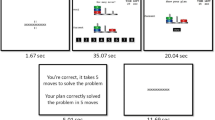Abstract
It was recently hypothesized that depression primarily is a motivational deficit, where motivation is defined as the product of expectancies and values. This hypothesis has been supported by literature indicating that depressives possess pessimistic expectancies or low outcome values. The present experiments directly tested the motivational hypothesis of depression by measuring both expectancies and absolute values. Experiment 1 supported the hypothesis by finding that depressives possessed lower values, lower expectancies, and therefore lower motivations for most rewards. Experiment 2 failed to support the motivational hypothesis by finding that depressives possessed lower absolute aversions, normal expectancies, and lower motivation for punishers. Differences were not the result of psychopathology in general. Both experiments supported several theories of depression but contradicted others. The major conclusion was that depression primarily is an affective indifference to almost all outcomes and an impaired motivation for almost all outcomes. Implications were drawn concerning the performances of depressives and concerning their responsiveness to certain psychotherapy techniques.
Similar content being viewed by others
References
Abramson, L. Y., Seligman, M. E. P., & Teasdale, J. D. Learned helplessness in humans: Critique and reformulation.Journal of Abnormal Psychology 1978,87 49–74.
Akiskal, H. S., & McKinney, W. T. Overview of recent research in depression.Archives of General Psychiatry 1975,32 285–305.
Beck, A. T. The development of depression: A cognitive model. In R. J. Friedman & M. M. Katz (Eds.),The psychology of depression: Contemporary theory and research. Washington, D.C.: Winston, 1974.
Bothwell, S., & Weissman, M. M. Social impairments four years after an acute depressive episode.American Journal of Orthopsychiatry 1977,47 231–237.
Buchwald, A. M. Depressive mood and estimates of reinforcement frequency.Journal of Abnormal Psychology 1977,86 443–446.
Costello, C. G. A critical review of Seligman's laboratory experiments on learned helplessness and depression in humans.Journal of Abnormal Psychology 1978,87 21–31.
Coyne, J. C. Depression and the response of others.Journal of Abnormal Psychology 1976,85 186–193.
DeMonbreun, B. G., & Craighead, W. E. Distortion of perception and recall of positive and neutral feedback in depression.Cognitive Therapy and Research 1977,1 311–329.
Ferster, C. B. Behavioral approaches to depression. In R. J. Friedman & M. M. Katz (Eds.),The psychology of depression: Contemporary theory and research. Washington, D.C.: Winston, 1974.
Fibel, B. L.Contingency of reinforcement and level of success in a learned helplessness paradigm among college females. Unpublished master's thesis, University of Massachusetts, Amherst, 1976.
Gotlib, I. H., & Asarnow, R. F. Interpersonal and impersonal problem-solving skills in mildly and clinically depressed university students.Journal of Consulting and Clinical Psychology 1979,47 86–96.
Haaf, R. A., & Smith, J. A. Developmental differences in reinforcer preference value in learning-set performance under inconsistent reward.Child Development 1976,47 375–379.
Harmon, T. M., Nelson, R. O., & Hayes, S. C. Self-monitoring of mood versus activity by depressed clients.Journal of Consulting and Clinical Psychology 1980,48 30–38.
Havighurst, R. J. Minority subcultures and the law of effect.American Psychologist 1970,25 313–322.
Hersen, M., Eisler, R. M., Alford, G. S., & Agras, W. S. Effects of token economy on neurotic depression: An experimental analysis.Behavior Therapy 1973,4 392–397.
Hicks, J. M., & Campbell, D. T. Zero point scaling as affected by social object, scaling method, and context.Journal of Personality and Social Psychology 1965,2 793–808.
Howes, M. J., & Hokanson, J. E. Conversational and social responses to depressive interpersonal behavior.Journal of Abnormal Psychology 1979,88 625–634.
Jones, L. V. Invariance of zero-point scaling over changes in stimulus context.Psychological Bulletin 1967,67 153–164.
Layne, C. Motivational deficit in depression: People's expectations × outcomes' impacts.Journal of Clinical Psycholgy 1980,36 647–652.
Layne, C., Gross, R. S., & Buckley, M. F. Ratio scales of the reward values and punisher aversions of depressed undergraduates.Journal of Clinical Psychology 1980,36 640–646.
Lewinsohn, P. M. A behavioral approach to depression. In R. J. Friedman & M. M. Katz (Eds.),The psychology of depression: Contemporary theory and research. Washington, D.C.: Winston, 1974.
Liberman, R. P., & Raskin, D. E. Depression: A behavioral formulation.Archives of General Psychiatry 1971,24 515–523.
Lloyd, G. G., & Lishman, W. A. Effect of depression on the speed of recall of pleasant and unpleasant experiences.Psychological Medicine 1975,5 173–180.
Lobitz, W. C., & Post, R. D. Parameters of self-reinforcement and depression.Journal of Abnormal Psychology 1979,88 33–41.
Morris, J. B., & Beck, A. T. The efficacy of antidepressant drugs: A review of research (1958–1972).Archives of General Psychiatry 1974,30 667–674.
Nelson, R. E., & Craighead, W. E. Selective recall of positive and negative feedback, self control behaviors, and depression.Journal of Abnormal Psychology 1977,86 379–388.
Rehm, L. P. Mood, pleasant events, and unpleasant events: Two pilot studies.Journal of Consulting and Clinical Psychology 1978,46 854–859.
Ross, R. T. Optimum orders for the presentation of pairs in the method of paired comparisons.Journal of Educational Psychology 1934,24 375–382.
Rush, A. J., Khatami, M., & Beck, A. T. Cognitive and behavior therapy in chronic depression.Behavior Therapy 1975,6 398–404.
Sacco, W. P., & Hokanson, J. E. Expectations of success and anagram performance of depressives in a public and private setting.Journal of Abnormal Psychology 1978,87 122–130.
Sanchez, V., & Lewinsohn, P. M. Assertive behavior and depression.Journal of Consulting and Clinical Psychology 1980,48 119–120.
Siegel, S.Nonparametric statistics for the behavioral sciences. New York: McGraw-Hill, 1956.
Thurstone, L. L., & Jones, L. V. The rational origin for measuring subjective values. In L. L. Thurstone,The measurement of values. Chicago: University of Chicago Press, 1959. Pp. 195–210.
Zigler, E. Social class and the socialization process.Review of Educational Research 1970,40 87–110.
Author information
Authors and Affiliations
Additional information
Thanks to Robert Haaf, for his help with ratio scaling procedures, and to Julie Cassidy.
Rights and permissions
About this article
Cite this article
Layne, C., Merry, J., Christian, J. et al. Motivational deficit in depression. Cogn Ther Res 6, 259–273 (1982). https://doi.org/10.1007/BF01173575
Issue Date:
DOI: https://doi.org/10.1007/BF01173575




